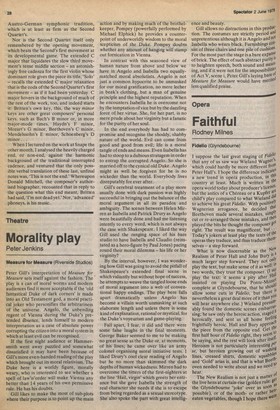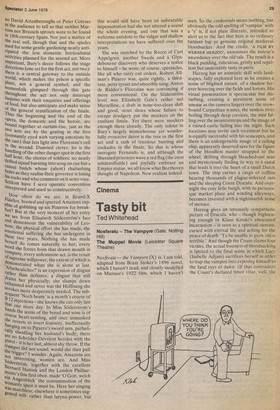Opera
Faithful
Rodney Milnes
Fidelio (Glyndebourne) I suppose the last great staging of Fidelio that any of us saw was Wieland Wagner's' which could hardly be more different from Peter Hall's. I hope the difference indicates a new trend in opera production, in this country at least. Much is written in the opera world today about producer's licence' but the antics of a Chereau or a Kupfer are, child's play compared to what Wieland di° to achieve his great Fidelio. With positive Wagnerian arrogance, he decided dia,t Beethoven made several mistakes, siMP'Y cut or re-arranged those mistakes, and thel: played the bits he thought the composer g°` right. The result was magnificent, but • Today's jokers at least play the texts of the operas they traduce, and thus traduce them' selves — a step forward. What is now discernable as the Isle* Realism of Peter Hall and John Bury much larger step forward. They not 00II play the text, but make sense of it as well: in two words, they trust the composer. (I I play the text: it seems a pity after insisted on playing Da Ponte-M°zar,` complete at Glyndebourne, that he shoul° allow some cuts in Fidelio, but there iS nevertheless a great deal more of it than Y°11 will hear anywhere else.) Wieland prestiny ably found the domestic scenes embarras.; sing; he saw only the heroic action, staged I heroically, and sent us all home feeling frightfully heroic. Hall and Bury approacli the piece from the opposite end. Get lb,,e first half hour of Fidelio right, they seem be saying, and the rest will look after itseli Heroism is not particularly interesting Per se, but heroism growing out of washing lines, creased shirts, domestic squabbles and 'Gold' arias is, and that is what Beet h' oven needed to write about and we need t° hear. The New Realism is not just a matter ot the live hens at curtain-rise (golden rule: ges the Glyndebourne 'joke' over as soon a possible), or of the mothor rather hen eaten vegetables, though I hope there Were no David Attenboroughs or Peter Coteses In the audience to tell us that neither Marrons nor Brussels sprouts were to be found in 18th-century Spain. Nor just a matter of the real soil, though that and the spades used for some gentle gardening neatly anticipated the less domestic horticultural activities planned for the second act. More important, Bury's decor follows the stage directions (one set for the first act, not two): there is a central gateway to the outside World, which makes the prison a specific Place, not a general symbol, and the Womenfolk glimpsed through this gate throughout the act not only interrupt Jaquino with their enquiries and offerings of food, but also anticipate and make sense of the general reunification of the finale. Thus the beginning and the end of the Opera, the domestic and the heroic, are bound together at curtain-rise, just as the two acts are by the grating in the first (constantly eyed with varying emotions by the cast) that lets light into Florestan's cell in the second. Damned clever. So is the handling of the other danger spot in the first half hour, the chorus of soldiers: no neatly drilled squad bursting into song on cue but a casual bunch whose (silent) rhubarbing fades as they realise their governor is losing his rocks and who comment on it sotto voce. Seldom have I seen operatic convention interpreted and used so constructively.
How often do we see, in Brand-X Fidel k's booted and spurred Amazons capable of gobbling up six Pizarros for breakfast? But at the very moment of her entry we see from Elisabeth Soderstrom's face and demeanour the vulnerability of Leofore, the physical effort she has made, the emotional suffering she has undergone in these two years. Nothing she has made herself do comes naturally to her; every word she forces from that drawn mouth in company, every unfeminine act, is the result of supreme willpower, the extent of which is demonstrated when she is alone at last. `Abscheulicherr is an expression of disgust rather than defiance, a disgust that still drains her physicially; she slumps down exhausted and never was the Hoffnung she invokes more desperately needed. The subse_ quent `Noch heute' is a month's course of 12 injections–she knows she can only last that one more day. In Miss Soderstrom's hands the scene of the bread and wine is of course heart-rending, and once unmasked she reverts to overt feminity, ineffectually flanging on to Pizarro's sword arm, pathetically sheidling her husband's body; there are no Schroder-Devrient heroics with the Pistol istol – it is her last, almost shy throw. If the the did not sound, would she dare pull too trigger? I wonder. Again, Amazons are 130t interesting, women are. And Miss :diderstriim, together with the excellent Bernard Haitink and the London Philharmonic's fine first oboe, made '0 Gott, welch ein Augenblick' the consummation of the Womanly spirit it must be. Here her singing was matchless; elsewhere it sometimes suggested willrather than larynx-power, but this would still have been an unbeatable impersonation had she not uttered a sound the whole evening, and one that was a welcome antidote to the vulgar and shallow interpretations we have suffered over the years. She was matched by the Rocco of Curt Appelgren, another Swede and a Glyndebourne discovery who deserves a notice to himself – he wore, of course, spectacles, like all who carry out orders. Robert Allman's Pizarro was, quite rightly, a thirdrate, petty tyrant and smoothly sung; Anton de Ridder's Florestan was convincing if more conventional. On the Soderstrom level was Elizabeth Gale's rather sad Marzelline, a drab in none-too-clean shift and good, stout shoes whose failure to escape drudgery put the mockers on the exultant finale. Yet there were mockers enough there already. The only colour in Bury's largely monochrome yet wonderfully evocative decor is the tree in the first act and a rash of tricolour bunting and cockades in the finale. So that is whose surrogate Fernando is, and although the liberated prisoners wave a red flag (the crest unidentifiable) and joyfully embrace an Empire statue, we all know what Beethoven thought of Napoleon. New realism indeed.







































 Previous page
Previous page